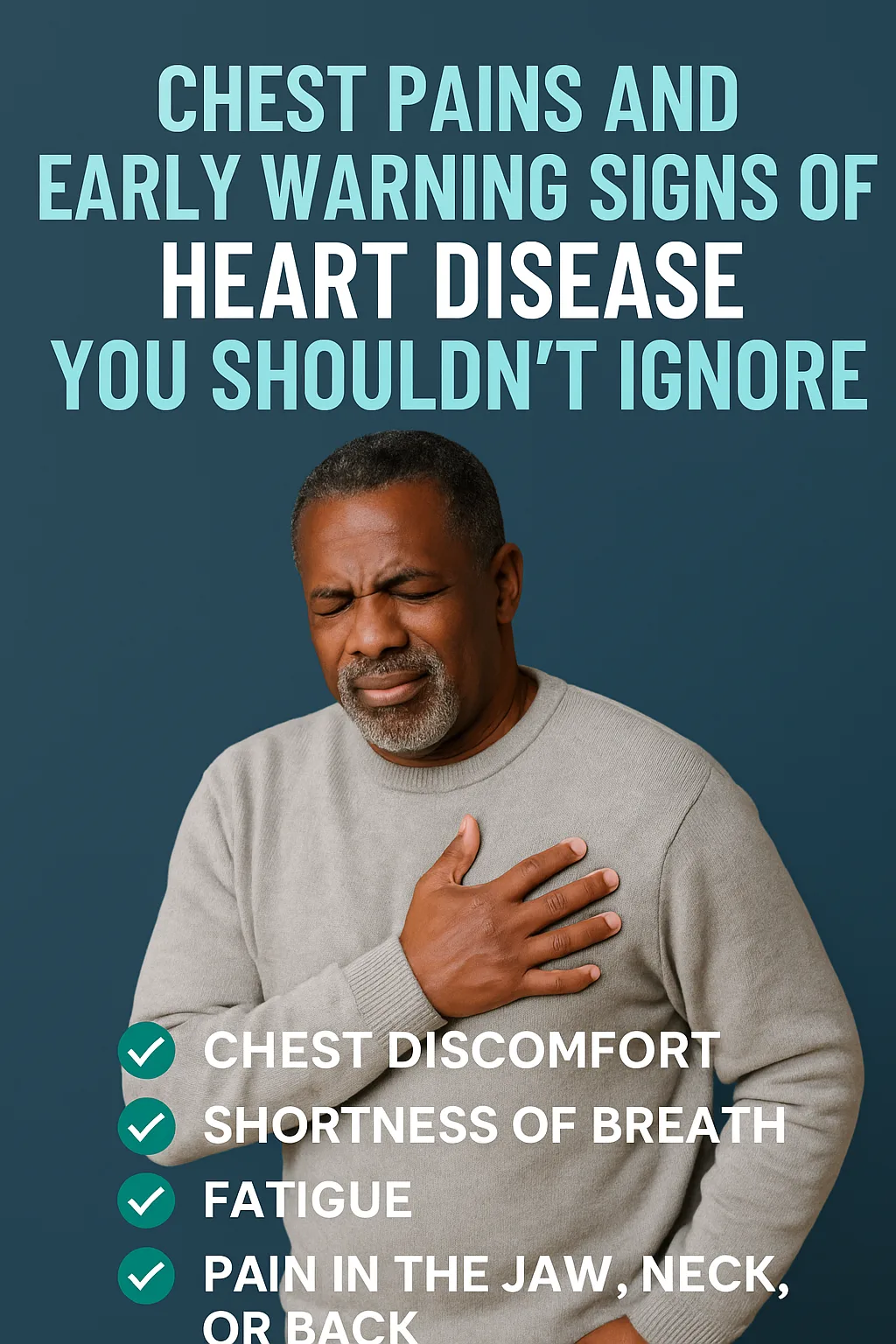Your heart is encased in your rib cage, and unlike your leg or eyes, which you could easily see and tell when something is wrong with you, it is difficult to tell when your heart is not functioning properly. However, there are early warning signs of heart disease, and these are signs you shouldn’t ignore.
People often misinterpret heart disease or its onset as an alarming chest clutch followed by a dramatic fall, like in the movies. Sorry to disappoint, but that’s not entirely true. In this blog post, we will discuss chest pains, the early symptoms of heart disease, and what to do if you or a loved one experiences them.
🩺 Tip: Knowing your body and reporting any discomfort or changes to a nearby health facility could save your life—especially if you are over 40 or have known risk factors like diabetes or high blood pressure.
✅ Does Every Chest Pain Relate to Heart Disease?
No, not all chest pain is heart-related. But any chest discomfort should be evaluated by a doctor.
Common non-cardiac causes of chest pain include:
- Heartburn or GERD
- Muscle strain
- Anxiety and panic attacks
- Respiratory infections
- Shingles
However, if the pain is accompanied by the following symptoms, it may be related to a heart condition:
- Pressure or tightness in the chest
- Pain spreading to the jaw, neck, shoulders, or left arm
- Dizziness, fainting, or shortness of breath
- Cold sweat
🫀 What Are Some Common Heart Diseases?
Heart disease, also called cardiovascular disease (CVD), includes several conditions affecting the heart and blood vessels. According to the World Health Organization (WHO), it is the leading cause of death globally.
1. Coronary Artery Disease (CAD)
Occurs when plaque builds up in the arteries supplying the heart, reducing blood flow.
Symptoms: Chest pain (angina), breathlessness, fatigue, heart attack.
Heart rate vs. blood pressure; How they relate to your health
2. Heart Attack (Myocardial Infarction)
Happens when blood supply to a section of the heart muscle is blocked.
Symptoms: Intense chest pain, pressure, pain radiating to arm/jaw, nausea, sweating.
3. Arrhythmias (Irregular Heartbeats)
Abnormal rhythm of the heart—either too fast, too slow, or erratic.
Symptoms: Fluttering, palpitations, fainting, anxiety.
4. Heart Failure
Occurs when the heart cannot pump blood efficiently to meet the body’s needs.
Symptoms: Swelling in ankles/feet, breathlessness, fatigue, coughing.
5. Valvular Heart Disease
Involves damage to one or more of the heart’s valves.
Symptoms: Chest tightness, irregular heartbeat, dizziness, fainting.
6. Cardiomyopathy
A disease of the heart muscle that reduces its ability to pump blood.
Symptoms: Breathlessness, fatigue, palpitations, swelling of the legs.
🚨 Early Warning Signs of Heart Disease You Shouldn’t Ignore
Heart disease symptoms are not always obvious. Here are some early warning signs that should raise a red flag:
- Chest discomfort or pressure
- Shortness of breath
- Unusual fatigue
- Pain in the jaw, neck, shoulder, or arms (especially left side)
- Dizziness or fainting spells
- Swelling in the legs or abdomen
- Persistent cough or wheezing (especially at night)
- Heart palpitations or skipped beats
⚠️ Important: Women, older adults, and people with diabetes may experience atypical symptoms, such as nausea or fatigue, without classic chest pain.
🔗 External reference: CDC – Heart Disease Facts
🆘 What to Do If You or a Loved One Experiences Any of These Symptoms
If you or someone around you is experiencing potential heart attack symptoms:
Step-by-Step Emergency Response:
- Call emergency services immediately (e.g., 112 in Ghana, 911 in the US)
- Have the person sit or lie down in a calm position
- Chew one adult aspirin (unless allergic or advised otherwise)
- Do not drive to the hospital—wait for an ambulance
- Start CPR if the person loses consciousness and stops breathing (if trained)
❤️ Final Thoughts
Heart disease can be silent but deadly. The good news is that most heart conditions are preventable and manageable if detected early.
Here’s what you can do:
- Exercise regularly
- Eat a heart-friendly diet (low in salt, sugar, and trans fats)
- Stop smoking
- Manage stress
- Get regular health checkups
- Monitor your blood pressure and cholesterol levels
🧠 Remember: It’s always better to get checked and be wrong than to ignore symptoms and risk your life.
📚 References:
- World Health Organization. Cardiovascular Diseases (CVDs)
- Mayo Clinic. Heart Disease
- Centers for Disease Control and Prevention (CDC). Know the Signs and Symptoms of Heart Attack
📝 Related Articles on InfoHealthGH:
The Scientifically Proven Ways to Lower Bad Cholesterol
What happens if you eat onions every day?
Six (6) Common fruits and vegetables to lower blood pressure.






